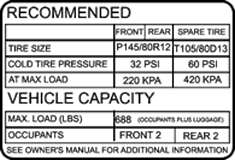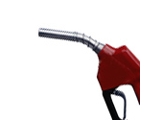Keep Your MINI Cooper Engine Properly Tuned
Fixing a car that is noticeably out of tune or has failed an emissions test can improve its gas mileage by an average of 4 percent, though results vary based on the kind of repair and how well it is done. Fixing a serious maintenance problem, such as a faulty oxygen sensor, can improve your mileage by as much as 40 percent.
SHOP MINI COOPER OXYGEN SENSORS HERE
| Fuel Economy Benefit: |
4%
|
|
| Equivalent Gasoline Savings: | $0.13/gallon |
|
Check & Replace Air Filters Regularly
Replacing a clogged air filter can improve your car's gas mileage by as much as 10 percent. Your car's air filter keeps impurities from damaging the inside of your engine. Not only will replacing a dirty air filter save gas, it will protect your engine.
SHOP MINI COOPER AIR FILTERS HERE
| Fuel Economy Benefit: |
up to 10%
|
|
| Equivalent Gasoline Savings: | up to $0.33/gallon |
|
Keep Tires Properly Inflated
You can improve your gas mileage by around 3.3 percent by keeping your tires inflated to the proper pressure. Under-inflated tires can lower gas mileage by 0.4 percent for every 1 psi drop in pressure of all four tires. Properly inflated tires are safer and last longer.
SHOP MINI COOPER TIRE PRESSURE PRODUCTS HERE
| Fuel Economy Benefit: |
up to 3%
|
|
| Equivalent Gasoline Savings: | up to $0.10/gallon |
|

Use the Recommended Grade of Motor Oil:
You can improve your gas mileage by 1-2 percent by using the manufacturer's recommended grade of motor oil. For example, using 10W-30 motor oil in an engine designed to use 5W-30 can lower your gas mileage by 1-2 percent. Using 5W-30 in an engine designed for 5W-20 can lower your gas mileage by 1-1.5 percent. Also, look for motor oil that says "Energy Conserving" on the API performance symbol to be sure it contains friction-reducing additives.
SHOP MINI COOPER OIL HERE
| Fuel Economy Benefit: |
1-2%
|
|
| Equivalent Gasoline Savings: | $0.03-$0.07/gallon |
|

Drive Sensibly
Aggressive driving (speeding, rapid acceleration and braking) wastes gas. It can lower your gas mileage by 33 percent at highway speeds and by 5 percent around town. Sensible driving is also safer for you and others, so you may save more than gas money.
| Fuel Economy Benefit: |
5-33%
|
|
| Equivalent Gasoline Savings: | $0.25-$1.20/gallon |
|
Observe the Speed Limit
While each vehicle reaches its optimal fuel economy at a different speed (or range of speeds), gas mileage usually decreases rapidly at speeds above 60 mph. As a rule of thumb, you can assume that each 5 mph you drive over 60 mph is like paying an additional $0.20 per gallon for gas. Observing the speed limit is also safer.
| Fuel Economy Benefit: |
7-23%
|
|
| Equivalent Gasoline Savings: | $0.22-$0.71/gallon |
|
Remove Excess Weight
Avoid keeping unnecessary items in your vehicle, especially heavy ones. An extra 100 pounds in your vehicle could reduce your MPG by up to 2%. The reduction is based on the percentage of extra weight relative to the vehicle's weight and affects smaller vehicles more than larger ones.
| Fuel Economy Benefit: |
1-2%/100 lbs
|
|
| Equivalent Gasoline Savings: | $0.03-$0.06/gallon |
|
Note: Cost savings are based on an assumed fuel price of $3.10/gallon.
Also...
Avoid Excessive Idling - Idling gets 0 miles per gallon. Cars with larger engines typically waste more gas at idle than do cars with smaller engines.
Use Cruise Control - Using cruise control on the highway helps you maintain a constant speed and, in most cases, will save gas.
Use Overdrive Gears - When you use overdrive gearing, your car's engine speed goes down. This saves gas and reduces engine wear.
Plan Ahead - Combining errands into one trip saves you time and money. Several short trips taken from a cold start can use twice as much fuel as a longer multipurpose trip covering the same distance when the engine is warm. Trip planning ensures that traveling is done when the engine is warmed-up and efficient. With a little planning, you can avoid retracing your route and reduce the distance you travel as well. You'll not only save fuel, but also reduce wear and tear on your car.
Commuting- If you can stagger your work hours to avoid peak rush hours, you'll spend less time sitting in traffic and consume less fuel.








